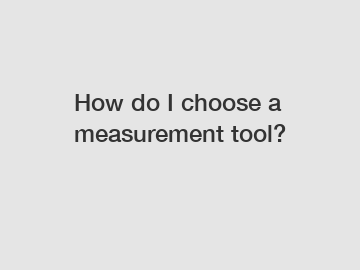How do I choose a measurement tool?
Choosing the Right Measurement Tool.
When it comes to measurement tools, there are countless options available on the market. However, selecting the right one for your specific needs can be a challenging task. Whether you are a professional in a scientific field, a DIY enthusiast, or simply someone looking to take accurate measurements around the house, having the right tools is essential. This article will provide you with some guidelines on how to choose the best measurement tool for your requirements.
Consider Your Needs.

The first step in choosing a measurement tool is to consider your specific needs. What type of measurements do you need to take? Are you looking for a tool that can measure length, width, depth, or do you need a tool that can measure more complex dimensions? Understanding the specific measurements you need to make will help narrow down the options available to you.
Accuracy and Precision.
One of the most important factors to consider when selecting a measurement tool is its accuracy and precision. Different tools have varying levels of accuracy, so it's essential to choose one that meets your requirements. If you need precise measurements, investing in a high-quality tool with excellent accuracy is crucial. On the other hand, if you only need to measure general dimensions, a less expensive tool may suffice.
Durability and Longevity.
Another essential factor to consider when choosing a measurement tool is its durability and longevity. Investing in a durable tool that can withstand regular use and last for an extended period will save you money in the long run. Look for tools made from high-quality materials that are built to last. Additionally, consider factors such as water resistance, dust resistance, and impact resistance, depending on where and how you plan to use the tool.
Ease of Use.
Usability is another critical factor to consider when selecting a measurement tool. Choose a tool that is easy to use and intuitive, especially if you are a beginner. Complex tools with numerous buttons and settings may be challenging to operate, leading to inaccurate measurements. Look for tools with user-friendly design features, such as easy-to-read displays, straightforward calibration procedures, and simple measurement modes.
Portability and Storage.
If you need to take measurements on the go or in various locations, portability is a crucial factor to consider. Choose a measurement tool that is lightweight and compact, making it easy to carry with you wherever you go. Additionally, consider how the tool can be stored when not in use. Some tools come with carrying cases or storage bags, which can help protect the tool and keep it organized when not in use.
Conclusion.
Choosing the right measurement tool is essential for obtaining accurate and reliable measurements. By considering factors such as your specific needs, accuracy and precision, durability and longevity, ease of use, portability, and storage, you can select the best tool for your requirements. Remember to invest in a high-quality tool that meets your needs and budget to ensure that you get the most value out of your purchase.
If you have any questions or need further assistance in choosing a measurement tool, feel free to contact us. We are here to help you find the perfect tool for your needs.
For more information, please visit PCB Cleaning Cloths, X-Ray Counter Machine, PCB Online Hole Checker.


